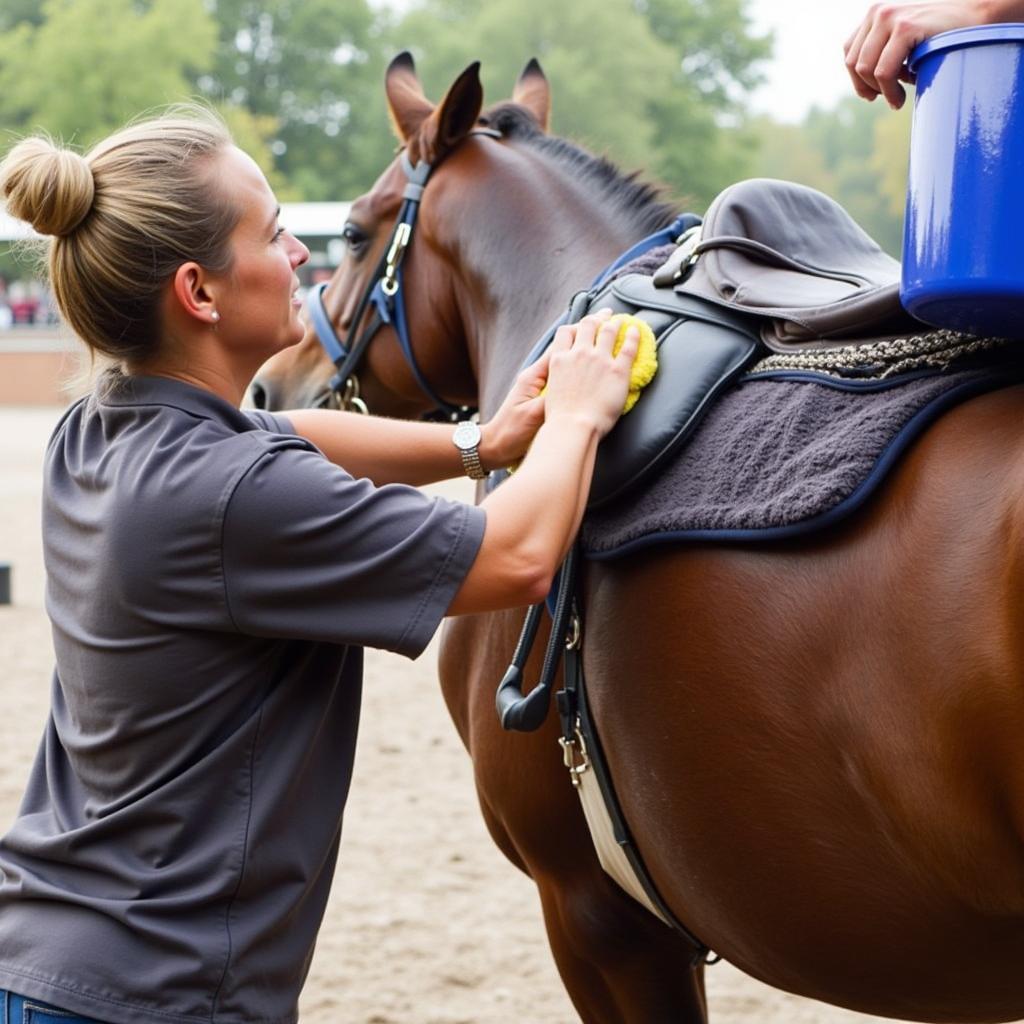Horse Neck Sweat is a common occurrence, but it’s not always as simple as it seems. While a light lather after a good workout is normal, excessive or unusual sweating around the neck can indicate a variety of factors, from workload and fitness level to potential health concerns. Understanding the reasons behind horse neck sweat is crucial for responsible horse ownership. Let’s delve into the nuances of this often-overlooked aspect of equine care.
Excessive sweating, especially localized around the neck, can be a sign of poor fitness. A horse that’s not accustomed to a particular workload will often sweat more profusely in those areas where the tack puts pressure. This is because their muscles are working harder to compensate for their lack of conditioning. Just like humans, horses need time to build up stamina and strength. horse lovers sweatshirts
Decoding the Sweat: What’s Normal and What’s Not
A light lather after exercise is perfectly normal, especially in warmer weather. However, drenching sweat, particularly if concentrated on the neck, warrants closer attention. Consider the intensity and duration of the workout. Was it a strenuous training session, or just a light hack? The amount of sweat should be proportionate to the exertion.
Is it Just the Weather, or Something More?
Environmental factors play a significant role in horse neck sweat. High humidity and temperature can make it harder for horses to cool down through evaporation, leading to increased sweating. A horse working in hot, humid conditions will naturally sweat more than one working in cool, dry weather. This is important to consider when evaluating the level of sweating.
Tack Fit: A Common Culprit of Horse Neck Sweat
Ill-fitting tack is a major contributor to localized sweating, particularly around the neck. A tight collar, an improperly adjusted saddle, or a pinching girth can restrict circulation and create friction, leading to excessive sweating in those specific areas. Regular tack checks are essential for ensuring a comfortable and safe ride for your horse. Are you looking for the right fit for your horse? Consider exploring different types of body clips for horses to accommodate the tack and weather conditions.
Underlying Health Issues and Horse Neck Sweat
While often benign, excessive horse neck sweat can sometimes indicate underlying health problems. Conditions like anhidrosis (the inability to sweat) can manifest as patchy sweating, while other metabolic or respiratory issues can also contribute to unusual sweating patterns. If you notice persistent or unexplained sweating, consult your veterinarian. They can perform a thorough examination to rule out any underlying medical conditions. Looking for suitable tack for a collar horse? Ensure it’s properly fitted to avoid excessive sweating.
Managing Horse Neck Sweat: Practical Tips
Proper cooling down after exercise is crucial for managing horse neck sweat and preventing chills. Gently scrape off excess sweat, and then use a cool water sponge or hose to rinse the sweaty areas. Continue to scrape and rinse until the water runs clear. This helps to regulate the horse’s body temperature and prevent overheating. Remember, proper care and management are crucial for your horse’s well-being.
 Horse Being Cooled Down After a Ride
Horse Being Cooled Down After a Ride
Why is my horse’s neck sweating so much?
Excessive neck sweating can stem from various factors like strenuous exercise, ill-fitting tack, hot weather, or even underlying health issues.
What does it mean when a horse sweats only on its neck?
Localized sweating, particularly on the neck, often points to tack issues or pressure points from equipment.
Should I be worried if my horse’s neck is always sweaty?
Persistent sweating, even without exertion, warrants veterinary attention to rule out potential medical conditions.
Dr. Amelia Shepherd, a renowned equine veterinarian, emphasizes the importance of observation: “Paying close attention to your horse’s sweating patterns can provide valuable insights into their overall well-being. Don’t dismiss seemingly minor changes, as they can sometimes be early indicators of more significant issues.”
Another expert, Dr. James Coleman, adds, “Proper tack fit is paramount. Pressure points from ill-fitting equipment can not only cause discomfort and excessive sweating, but also lead to more serious problems down the line.”
In conclusion, horse neck sweat is a multifaceted issue that demands careful consideration. While often a normal physiological response to exercise or heat, it can also signal underlying problems. By understanding the various factors that contribute to horse neck sweat and implementing appropriate management strategies, we can ensure the comfort and well-being of our equine companions. Regular tack checks, proper cooling down routines, and vigilant observation are key to addressing this common concern. Remember, a comfortable horse is a happy horse! You can find comfortable stable sheets for horses to help manage sweat and keep your horse comfortable after exercise. Are you a fan of Band of Horses t-shirt?
FAQ:
- Can stress cause a horse to sweat on its neck?
- How can I tell if my horse’s tack is causing excessive sweating?
- What are the signs of anhidrosis in horses?
- Is it normal for a horse to sweat more in the summer?
- What should I do if my horse’s neck is sweating excessively even after cooling down?
- Can certain medications cause increased sweating in horses?
- How often should I check my horse’s tack fit?
You might also be interested in reading about other horse care topics on our website, such as grooming tips, nutritional advice, and training techniques.
For any assistance, please contact us: Phone: 0772127271, Email: [email protected] Or visit us at: QGM2+WX2, Vị Trung, Vị Thuỷ, Hậu Giang, Việt Nam. We have a 24/7 customer service team.